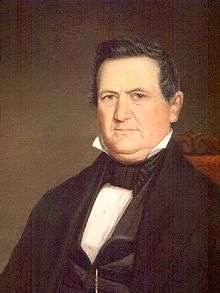Joshua Baker
Joshua Gabriel Baker (March 23, 1799 – April 16, 1885) was the 22nd Governor of Louisiana during Reconstruction.
Joshua Baker | |
|---|---|
 | |
| 22nd Governor of Louisiana | |
| In office January 8, 1868 – June 27, 1868 | |
| Lieutenant | Albert Voorhies |
| Preceded by | Benjamin Flanders |
| Succeeded by | Henry C. Warmoth |
| Personal details | |
| Born | March 23, 1799 Mason County, Kentucky |
| Died | April 16, 1885 (aged 86) Lyme, Connecticut, New London County |
| Political party | Unionist |
| Spouse(s) | (1) Fanny Assherton (2) Catherine Patton |
Early life
Joshua was born March 23, 1799 in Mason County, Kentucky. His father was Joshua Baker and his mother was Susan Lewis. In 1803, the Baker family moved to the Mississippi Territory and by 1811 they had settled at Oaklawn Plantation in St. Mary Parish, Louisiana in the Territory of Orleans
Education and military service
Baker attended the United States Military Academy at West Point, New York from 1817 to 1819. Whereupon, he was commissioned a Second Lieutenant in the Army Artillery Corps and served as an assistant professor at West Point before resigning in October 1820. In 1821 he moved to Litchfield, Connecticut to study law, joining the bar in Mason County, Kentucky in 1822. Baker returned to Louisiana to practice law at the Opelousas, Louisiana office of John Brownson during 1822–1829 and 1832–1838.
In 1825, Baker married Fanny Assheton Stelle in Opelousas. They had three children before she died on August 17, 1831. From 1826 to 1829 Baker was a Colonel in the Louisiana State Militia. He also worked on Engineering projects in Plaquemines Parish until 1829, when he was appointed Judge in St. Mary Parish; a position he held until 1839.
He married a second time to Catherine Patton from Fairfax, Virginia in 1832. They had two children. In 1833, he was Assistant State Engineer for the State of Louisiana until 1838. He was appointed Director of Public Works for the State of Louisiana 1840–1845.
He was made Captain of Cavalry, Louisiana State Militia 1846 until 1851 and in 1853, he was appointed to the Board of Visitors United States Military Academy, serving until 1861. Throughout this time, Baker owned three plantations: Black Bayou in Terrebonne Parish, Grand River in St. Martin Parish, and Fairfax Plantation in St. Mary Parish. He also was enthusiastic investor in steamboat properties.
Civil War and Governorship
With secession and the Civil War, Colonel Baker retired to Franklin, Louisiana in 1861. As a Conservative Democrat who opposed secession, he chose to cooperate with the Union Army of Occupation. On January 8, 1868, Baker took the Oath of Loyalty to the Union. He was Appointed Military Governor by General Winfield Scott Hancock upon the resignation of Benjamin Flanders. As Governor, Baker supported the lenient reconstruction plan of President Andrew Johnson. His administration has little influence on the course of the Louisiana government. On March 10, 1868, Governor Baker was arrested and brought before a commissioner charged with perjury for claiming not to build a barricade across Bayou Teche. Meanwhile, General Hancock unilaterally removes 9 New Orleans City Councilmen which results in President Ulysses S. Grant's reversal of this order. For this, Hancock asks to be reassigned. With Hancock's departure, support for Governor Baker evaporated and in a special election Republican Henry C. Warmoth was elected Governor.
Joshua Baker died in Lyme, Connecticut on April 16, 1885 at "Cricket Lawn" the home of his daughter Margaret Van Bergen. He was interred in The Green-Wood Cemetery, Brooklyn, New York on April 17, 1885, Lot 11296, Section 171.
Sources
| Political offices | ||
|---|---|---|
| Preceded by Benjamin Flanders |
Governor of Louisiana 1868 |
Succeeded by Henry C. Warmoth |
